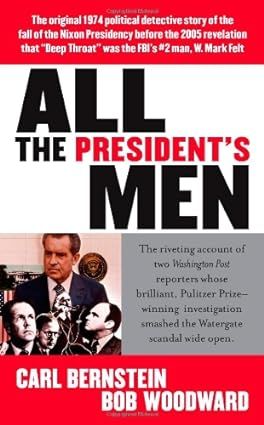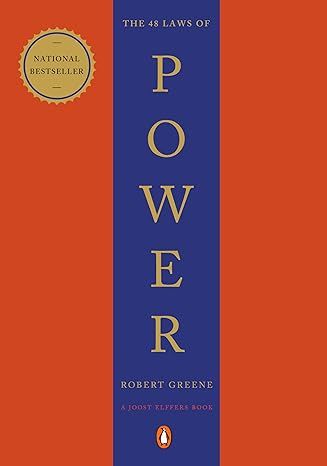All the President's Men
4.6
-
2,747 ratings
The full account of the Watergate scandal from the two Washington Post reporters who broke the story. This is “the work that brought down a presidency…perhaps the most influential piece of journalism in history” (Time, All-Time 100 Best Nonfiction Books).
This is the book that changed America. Published just two months before President Nixon’s resignation, All the President’s Men revealed the full scope of the Watergate scandal and introduced for the first time the mysterious “Deep Throat.” Beginning with the story of a simple burglary at Democratic headquarters and then continuing through headline after headline, Bernstein and Woodward deliver the stunning revelations and pieces in the Watergate puzzle that brought about Nixon's shocking downfall. Their explosive reports won a Pulitzer Prize for The Washington Post, toppled the president, and have since inspired generations of reporters. All the President’s Men is a riveting detective story, capturing the exhilarating rush of the biggest presidential scandal in U.S. history as it unfolded in real time. It is, as former New York Times managing editor Gene Roberts has called it, “maybe the single greatest reporting effort of all time.”
eTextbook
$13.99
Available instantly
Audiobook
$0.00
with membership trial
Hardcover
$47.82
Paperback
$16.64
Ships from
Amazon.com
Payment
Secure transaction
ISBN-10
0671894412
ISBN-13
978-0671894412
Print length
349 pages
Language
English
Publisher
Simon & Schuster
Publication date
June 15, 1994
Dimensions
5.75 x 0.75 x 8.5 inches
Item weight
11.2 ounces
Product details
ASIN :
B000SEOIDS
File size :
36879 KB
Text-to-speech :
Enabled
Screen reader :
Supported
Enhanced typesetting :
Enabled
X-Ray :
Not Enabled
Word wise :
Enabled
Editorial Reviews
"The work that brought down a presidency . . . perhaps the most influential piece of journalism in history." ― Time, All-Time 100 Best Non-Fiction Books
"Maybe the single greatest reporting effort of all time." -- Gene Roberts, former managing editor of The New York Times
"One of the greatest detective stories ever told." ― The Denver Post
"A fast-moving mystery, a whodunit written with ease. . . . A remarkable book." ― The New York Times
"An authentic thriller." -- Dan Rather
"Much more than a 'hot book.' It is splendid reading . . . of enormous value. . . . A very human story." ― The New Republic
Sample
Watergate At 50 Years
PRESIDENT GEORGE Washington, in his celebrated 1796 Farewell Address, cautioned that American democracy was fragile. “Cunning, ambitious, and unprincipled men will be enabled to subvert the power of the people and to usurp for themselves the reins of government,” he warned.
Two of his successors—Richard Nixon and Donald Trump—demonstrate the shocking genius of our first president’s foresight. As reporters, we had studied Nixon and written about him for nearly half a century, during which we believed with great conviction that never again would America have a president who would trample the national interest and succeed in undermining democracy through the audacious pursuit of personal and political self-interest. And then along came Trump.
The heart of Nixon’s criminality was his successful subversion of the electoral process itself—the most fundamental element of American democracy. He accomplished it through a massive campaign of political espionage, sabotage and disinformation that enabled him to literally determine who his opponent would be in the presidential election of 1972.
With a covert budget of just $250,000 a team of undercover Nixon operatives derailed the presidential campaign of Senator Edmund Muskie of Maine, the Democrats’ most electable candidate.
Nixon then ran against Senator George McGovern, a South Dakota Democrat widely viewed as the much weaker candidate, and won in a historic landslide with 61 percent of the vote and carrying 49 of the 50 states.
Over the next two years, Nixon’s illegal conduct was gradually exposed by the news media, the Senate Watergate Committee, special prosecutors, a House impeachment investigation, and finally by the Supreme Court. In a unanimous decision, the court ordered Nixon to turn over his secret tape recordings that doomed his presidency.
These instruments of American democracy finally stopped Nixon dead in his tracks, forcing the only resignation of a president in American history.
Read more
About the authors
Carl Bernstein
Few journalists in America’s history have had the impact on their era and their craft as Carl Bernstein. For forty years, from All the President’s Men to A Woman-In-Charge: The Life of Hillary Clinton, Bernstein’s books, reporting, and commentary have revealed the inner-workings of government, politics, and the hidden stories of Washington and its leaders.
In the early 1970s, Bernstein and Bob Woodward broke the Watergate story for The Washington Post, leading to the resignation of President Richard Nixon and setting the standard for modern investigative reporting, for which they and The Post were awarded the Pulitzer Prize.
Since then, Bernstein has continued to build on the theme he and Woodward first explored in the Nixon years–the use and abuse of power: political, media, financial, cultural and spiritual power. Renowned as a prose stylist, he has also written a classic biography of Pope John Paul II, served as the founding editor of the first major political website, and been a rock critic.
Read more
Reviews
Customer reviews
4.6 out of 5
2,747 global ratings
Eliezer
5
My favorite book
Reviewed in the United States on May 29, 2013
Verified Purchase
On June 17, 1972, five men were arrested for breaking into the Democratic National Committee headquarters at the Watergate building. All five were family men dressed in suits and caught with equipment in what appeared to be an elaborate plot to bug the DNC headquarters. What did it all mean?
Enter aspiring young Washington Post reporters Carl Bernstein and Bob Woodward. With President Nixon's re-election committee denying any involvement in the plot, it appeared the Watergate story could have been ephemeral if not for the persistent investigative reporting of Woodward and Bernstein. Initially competing for the story, Woodward and Bernstein (sometimes referred to as "Woodstein") became partners when the advantages of working together became apparent to them. Contacts were mostly divided between the two so a personal relationship could be developed with sources, a journalistic necessity in the midst of a scandal in which few were willing to talk out of fear.
It wasn't long before the two reporters realized the plot went higher up than ever imagined. The sources who were willing to talk needed prodding and guesswork by Woodward and Bernstein in order to protect themselves. The most famous among these sources--and possibly the most famous informant in American history--was Deep Throat. The highly secretive man made sure that Woodward took extra precautions when scheduling middle-of-the-night meetings with him in a parking garage, which included taking several cabs to make sure he wasn't being followed. The only hint of his position in government that Woodward gives is his unique position to observe the Executive Branch. Throughout the book, Deep Throat provides accurate insider information, and turns out to be Woodward's most reliable source during the entire event.
Whether you lived through the Nixon presidency, or if the only thing you know is that Nixon resigned because of Watergate, this important book will give you the play-by-play in how investigative reporting contributed to the downfall of a president. "All the President's Men" reads like a political thriller from start to finish, and will leave you wanting more when it's over. For history buffs, political junkies, or any American who wants to know what Watergate was all about, this is an essential read. As my favorite book of all time, I can't recommend this book by Bob Woodward and Carl Bernstein highly enough.
Read more
8 people found this helpful
Esther Schindler
5
Worth a re-read, just to appreciate journalism done right
Reviewed in the United States on February 4, 2018
Verified Purchase
I first read All the President's Men shortly after the book came out in the 1970s, and well before the movie came out. To be truthful I found it slow going, at the time, as I'd hoped for some kind of dramatic narrative. But the daily life of journalists rarely has AHA NOW WE KNOW WHO THE MURDERER IS denouements. It's a slow-moving process of looking at one fact at a time, asking the right question of the right person, cajoling someone to go on the record, and noticing what ISN'T said. ...Which, actually, is what made me conclude that I wasn't meant for a writing career.
Ha ha ha. But we digress.
My journalism career went in a different direction, which thankfully did not include talking to unwilling sources. Still, I can and should learn new skills, so I signed up for a masterclass with Bob Woodward. Which, naturally made me decide to read the book again. This time I was enthralled. And that, in part, is because brilliant journalism has once again become relevant.
Should you know of Woodward/Bernstein only in general "Oh weren't they the guys who discovered the Watergate break-in?" terms: In June, 1972, the two young Washington Post newspapermen began by covering an odd attempted robbery of the Democratic National Committee. A few years later, President Nixon resigned.
There were a LOT of dots necessary to connect those two events.
In one sense, this book is a recording of the history of the time: the people, events, cover-ups, and so on. After all, to this day we call any brouhaha a Something-Gate, and most of us think of Deep Throat as the long-unnamed senior administrative source, not of the movie from which title that name sprang.
The book is also obviously an example of journalism at work, which is ultimately a process of noticing. When Bernstein was sent to the courthouse where bail was set, he paid attention when McCord said he had been a security consultant for the CIA. If he'd been doodling in his notebook, instead...? What held my attention was the detail of the journalistic process, such as one of the reporters driving to a possible source's home to knock on the door, and what they said to make the individual feel at-ease (enough to share information anyway) -- as well as the relevant excerpt from the story that was published. And, sometimes, for what was left out.
All of this feels more poignant today, as a reminder that people in power -- who have reason to hide their activities -- do their best to obfuscate their behavior and to blame the media. At an October White House briefing, the press secretary Zeigler went on quite a rant: "Well, I think the opposition is clear. You know, since the Watergate case broke, people have been trying to link the case to the White House... and no link has been established... because no link exists." (Question: Why don't you deny the charges?) "I am not going to dignify these types of stories with a comment... It goes without saying that this administration does not condone sabotage or espionage or surveillance of individuals, but it also does not condone innuendo or source stories that make broad sweeping charges about the character of individuals."
In other words, concluded the book's authors, "The White House had decided that the conduct of the press, not the conduct of the President's men, was the issue."
I really enjoyed my re-read of the book. I dare say you will, too.
Read more
20 people found this helpful
Inna Tysoe
5
Made Me Wistful
Reviewed in the United States on April 13, 2014
Verified Purchase
This is an interesting book for many different reasons. First of all, this is a book as much about how journalism ought to be done as it is about what is being reported. At least two sources had to support everything they put in the paper and, if one of them disagreed with the conclusions or the facts of a story, that story never made the paper. And yes, that occasionally meant weeks without a Watergate story. Imagine that in these days of CNN and Fox assuring their viewers that the Supreme Court struck down the Affordable Care Act. Not only did Woodward and Bernstein have to read, they were expected to get it right.
Which is not to say that they did not make mistakes. If you’ve seen the movie, you have seen the most dramatic mistake they made about Haldeman. But there was another, earlier error that wronged three men and truly made life difficult for them. Or, as Woodward and Bernstein put it in their book, “The stigma of Watergate stayed with [one of them], and he had great difficulty obtaining a job.”
Watergate, which almost by accident, “made” these gutsy, chutzpah-filled reporters also was the undoing of some. Some who were not guilty. And then there is the story itself. A story that was deeply shocking. Campaign funds used to spy on the opposition, to lie about the opposition, to bug buildings, to subvert justice. When someone couldn’t pay their “tithe” they were “cut loose.” And then the blurring of the division of powers. And how the Executive Branch went after the opposition—the Post, individual reporters. (Woodward and Bernstein had to get a lawyer to mind their finances or they would have been in trouble with the IRS.) The shock of that. It was interesting to read that in an age when everything posted on Twitter will be preserved forever, when the NSA is bugging the world (and not just a few buildings) when the IRS does this sort of thing as a matter of course. And when none of it makes the front page news. We expect this sort of thing from our government now. It’s no longer shocking.
I finished the book in a wistful mood. Wistful for a time of real reporting—when you actually had to pound the pavement, talk to people, check out your facts, and –if you weren’t sure you didn’t have a story. And wistful for a time when we, as a nation, could still be shocked.
Read more
4 people found this helpful
The Literary Lioness
5
The Parallels to the current regime are astonishing
Reviewed in the United States on August 17, 2018
Verified Purchase
The whole scandal started on June 17, 1972 when burglars broke into the Democratic party headquarters at the Watergate Hotel. This was the beginning of a scandal that rocked the Presidency and led to Nixon’s resignation.
For more than two years, there had been much coverage of the break-in and who was involved and who ordered it. In the summer of 1973, Senate committee hearings were held on live television which had many memorable moments.
The most famous continual coverage of the scandal was done by The Washington Post. The reporters who got the most attention were Carl Bernstein and Bob Woodward. In 1973 the newspaper received the Pulitzer Prize for Public Service.
In 1974 Woodward and Bernstein published a book called All the President’s Men which explained what happened up til that point (the book was published before Nixon resigned.)
All the President’s Men is an excellent example of not only political coverage, but ethics in journalism. When Woodward was first assigned the story on Saturday, June 18, 1974, he assumed the break-in was at the local Democratic party headquarters. When he went to cover the story at the courthouse when the burglars were arraigned, he was stunned to find out that one of the burglars had worked for the CIA.
You feel the tension start to build as the reporters and editors at WAPO start putting the pieces together as they interview scores of witnesses, including the infamous Deep Throat. They do not shy away from admitting they made mistakes along the way.
All the President’s Men is an excellent book and will keep you riveted until the last page.
Read more
16 people found this helpful
DWillis
4
The REAL White House scandal of our time
Reviewed in the United States on July 6, 2000
Verified Purchase
All the President's Men is a timeless work, and will be a valuable reference for historians, political scientists, and (most importantly) citizens for years to come. The book succeeds on two levels. First, it provides a fascinating description of investigative journalism at its finest - the exhaustive search for reliable sources, the need to check and double-check information, the judicious use of editors in both the writing process and the ultimate decision whether to even publish a piece. To the credit of Woodward, Bernstein, and the entire Washington Post staff, the paper was quite conservative in deciding what (and when) to publish, and quick to make amends in the rare instances when they erred in their accounts. Second, the book remains the definitive "in the moment" guide to the collapse of the Nixon presidency. In the wake of the Clinton presidency, after the proliferation of such non-scandals as Whitewater, Travelgate, and the laughably irrelevant Lewinsky matter, it is important to understand what REAL presidential misbehavior is all about. Although the book concludes prior to Nixon's resignation, the detailed elucidation of the activities of both the White House and the Committee to Re-Elect the President leave little doubt that the Nixon Administration was guilty of high crimes and misdemeanors against the American people. Both the Nixon presidency and the subsequent "pardoning" from Gerald Ford were disgraces in American history. As a final note, although Bob Dole is only a minor player in the story, his behavior is worth noting for the insight it provides into his character. His scathing indictment of the Post in his speeches at the time serve as an important reminder of Dole's ties to the most corrupt domestic administration of the 20th century. ATPM is an important volume in contemporary American history. It should be mandatory reading for all citizens.
Read more
9 people found this helpful
Similar Books
Best Sellers

The Great Alone: A Novel
4.6
-
152,447
$5.49

The Four Winds
4.6
-
156,242
$9.99

Winter Garden
4.6
-
72,838
$7.37

The Nightingale: A Novel
4.7
-
309,637
$8.61

Steve Jobs
4.7
-
24,596
$1.78

Iron Flame (The Empyrean, 2)
4.6
-
164,732
$14.99

A Court of Thorns and Roses Paperback Box Set (5 books) (A Court of Thorns and Roses, 9)
4.8
-
26,559
$37.99

Pretty Girls: A Novel
4.3
-
88,539
$3.67

The Bad Weather Friend
4.1
-
34,750
$12.78

Pucking Around: A Why Choose Hockey Romance (Jacksonville Rays Hockey)
4.3
-
41,599
$14.84

Start with Why: How Great Leaders Inspire Everyone to Take Action
4.6
-
37,152
$9.99

Tomorrow, and Tomorrow, and Tomorrow: A novel
4.4
-
95,875
$13.99

Weyward: A Novel
4.4
-
27,652
$11.99

Tom Lake: A Reese's Book Club Pick
4.3
-
37,302
$15.74

All the Sinners Bleed: A Novel
4.4
-
12,894
$13.55

The Mystery Guest: A Maid Novel (Molly the Maid)
4.3
-
9,844
$14.99

Bright Young Women: A Novel
4.2
-
8,485
$14.99

The Wager: A Tale of Shipwreck, Mutiny and Murder (Random House Large Print)
4.5
-
28,672
$14.99

Hello Beautiful (Oprah's Book Club): A Novel (Random House Large Print)
4.4
-
79,390
$14.99

Small Mercies: A Detective Mystery
4.5
-
16,923
$10.00

Holly
4.5
-
31,521
$14.99

The Covenant of Water (Oprah's Book Club)
4.6
-
69,712
$9.24

Wellness: A novel
4.1
-
3,708
$14.99

The Art Thief: A True Story of Love, Crime, and a Dangerous Obsession
4.3
-
4,805
$14.99



